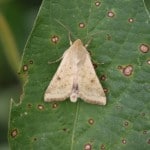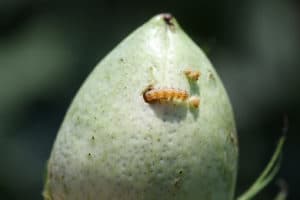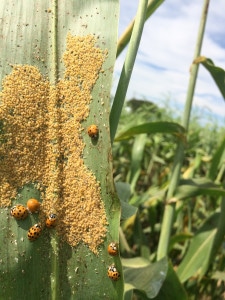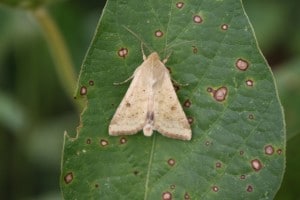As corn harvest begins and we start finishing off the cotton crop, it’s hard to find time to keep up the good fight on soybean insect management. But make no mistake that late August through September is the most critical time to scout and manage insects in late maturing soybean! Continue reading
All posts by Scott Stewart, West TN Research & Education Center
Cotton and Soybean Insect Update: Is it a Wormy Year or Not?

Sometimes there is no substitute for scouting. Spraying based on rumor or what your neighbor does will get you in trouble (or waste money). I predicted a relatively large corn earworm (bollworm) moth flight, but the average trap catches don’t support that. Having said that, there are definitely pockets of bollworms in late soybean and more widespread issues in cotton. Cotton maturity is all over the board depending on planting date, variety, and field conditions. The most mature cotton is Continue reading
Bollworm Management in the Coming Weeks

Although current moth activity remains relatively low, I’m expecting a peak of moth activity sometime beginning around August 5th through 10th. Bollworm (a.k.a., corn earworm) poses a significant threat to cotton and soybean, and particularly late planted soybean that are still flowering when the flight arrives. Below are some thoughts on managing for this troubling pest. Continue reading
Emergency Label Approved for Sivanto in Sweet Sorghum for Sugarcane Aphids

Please see the authorization letter linked below which allows the use of Sivanto (flupyradifurone) for control of sugarcane aphids in sweet sorghum. This product is already registered for use in grain sorghum. The authorization letter lists restrictions for the use of this product. Thanks to the EPA for once again granting this section 18 exemption.
Virtual Milan No-till Field Day … Available Now!
Follow the link below to experience the 2020 Milan No-till Field Day at your own pace! You can watch an entire tour by clicking on its name, or just one presentation by clicking on a specific title.
Please note, all links will open in a new tab. Closed captions are available by clicking the “CC” button on the right side of the video’s play bar.
https://milannotill.tennessee.edu/research-tours/
Insect Update from the Trenches

Cotton – Although plant bug populations remain lighter that usual, we are now seeing treatment levels in many fields. It’s time to switch to the drop cloth for best results. The treatment threshold for tarnished plant bug beginning at first flower is 3 tarnished plant bugs per drop cloth. You should maintain this threshold until about NAWF5+250 DD60s, at which time Continue reading
Insecticide Concoctions for Plant Bugs in Blooming Cotton
Although pressure is currently below average, it is increasing, which is to be expected as we enter the early blooming window. We have limited but good options to control plant bugs in blooming cotton. I often tell folks that if you call me once bloom starts, I’ll often only mention 4-5 products, sometimes in combination. Those include Acephate/Orthene, Diamond, Transform, and Bidrin. Vydate also gets and honorable mention. These are the core products suggested for mid-season plant bug control. Below are some treatment options I like, in no particular order. However, Continue reading
Moth Trapping Update
A reminder that moth trap catches are reported weekly for corn earworm (bollworm), tobacco budworm, and southwestern corn borer. You can find these data under the Quick Links menu of this web site which takes you to the link below.
http://www.utcrops.com/BlogStuff/2020MothTrappingData.pdf

We are also seeing an increase in bollworm moth catches. I’m hopeful many of these moths will target later corn rather than cotton or soybean, but Continue reading

